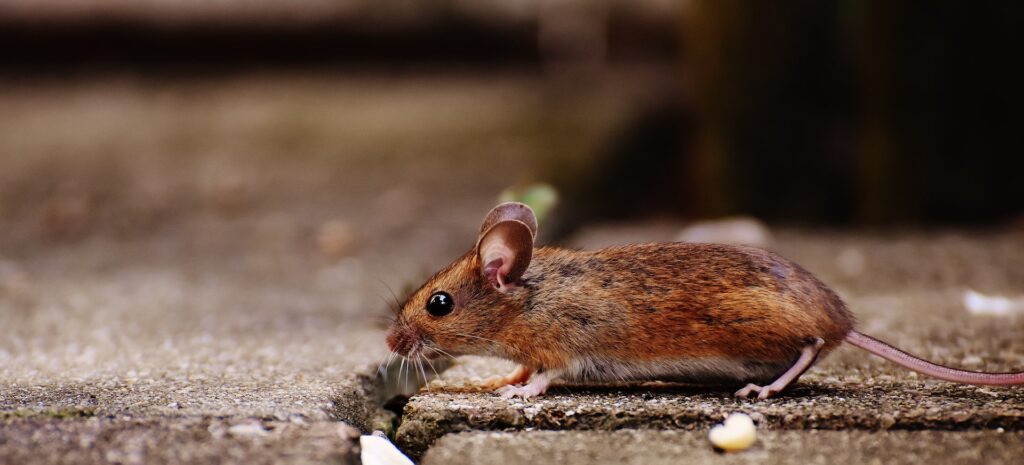This guide will demonstrate how to manage rodents in Maryland or nationwide.
Rodents in Maryland

Rodents make up the largest group of mammals in the world and are distinguished by their continuously growing front incisors. Rodents can vary in size and species, from the small four-inch field mouse to a large groundhog.
Many species of rodents have come to rely on people for their survival, which has caused them to become a major problem inside homes and businesses.
Common Types of Rodents in Maryland
The most common species of rodents causing problems for people living in Maryland include mice and rats. Below, we list each species of mouse and rat you may encounter.
- Norway Rats: Norway rats have heavy, dense bodies. They are not great climbers and typically enter homes and other buildings through the ground floor. Norway rats have shaggy fur that is brown or gray in color. Their underbelly is lighter in color. Norway rats’ bodies grow to about 9 ½ inches in length, and their bi-colored tails add another 6 to 8 inches.
- House Mice: House mice have small, slender bodies that grow to between 2 ½ and 3 ¾ of an inch in length. Their tails add another 3 to 4 inches to their total length. Their tails and large ears are covered in a light layer of soft, velvety fur. The color of their fur can vary between grayish-brown, dark gray, or black. Female mice can reproduce in as little as 22 days and give birth to a litter of 3-5 mice.
- Field Mice: Field mice are usually gray or tawny brown in color, and their underbellies are covered in white hairs that extend back behind their tails. They also have lighter-colored, or white, feet. Field mice have short tails that are about the same length as their bodies. From nose to tail, adult field mice grow to between 5 and 8 inches in length.
- Deer Mice: Deer mice have large ears covered in fur, black eyes, and a slender build. Adults are brownish-red or grayish-brown in color and have lighter, whitish-colored underbellies and feet. Their tails are covered in fine hair and are bi-colored: darker on top and lighter-colored on the underside.
Most of these rodents make themselves known during the winter.
However, you may encounter other species of rodents during the warmer seasons, such as squirrels and groundhogs, though they tend to cause more damage to your yard than your home.
Are Rodents Dangerous?
Rodents are a danger to both people and property when living inside homes or other buildings. Some examples of negative rodent behavior include:
- Structural damage is caused by chewing through electrical wires, lumber, insulation, drywall, duct work, and flooring.
- Allergic reactions and asthma attacks.
- Transmission and spread of many serious diseases, including Lymphocytic choriomeningitis (LCM), salmonellosis, dysentery, Hantavirus, and leptospirosis.
- Chewing habits that cause fires and water damage.
- Damage to personal items like furniture, clothing, and books.
- Contaminated food sources due to contact with rodents.
Why Do I Have a Rodent Problem?
Properties that are located next to or in close proximity to fields, parks, wooded areas, and meadows tend to have problems with rodents. Rodents living out in the wild are typically attracted to properties that provide them easy access to food, water, and shelter.
Rodents will feed on, drink from, or seek shelter in the following:
- Vegetable and fruit gardens
- Compost piles
- Pet food
- Open containers of garbage
- Outdoor eating areas
- Bird seed
- Bird baths
- Clogged gutters
- Wild animal feeders
- Wood piles
- Dense vegetation
- Piles of debris
While rodents invade homes and other buildings throughout the year, they become more problematic in the late fall and winter months when they are looking for shelter where they can overwinter.
Signs of a Rodent Infestation
Rodents are nocturnal creatures, which means they can often live in your home for weeks without detection.
However, some signs of rodent activity to look out for include:
- Droppings: Rodents often leave behind droppings in areas where they tend to congregate, especially in places where this is food.
- Gnaw Marks: Gnaw marks are natural as rodents need to continually gnaw on something to prevent their teeth from growing too big. Gnaw marks are usually food on wires, plastic, and cardboard.
- Nesting Materials: Rodents can make nests out of shredded paper and cardboard, so look out for small piles with these items in them.
- Sounds in Walls and Floors: Hearing scurrying sounds across your ceiling, walls, or floors could be a telltale sign of an active rodent infestation.
If you spot a mouse hole on your property, fill it with dirt. If you return the next day and the hole is empty, it means a mouse is nesting in there.
Rodent Prevention Tips
The following tips can help you prevent future problems with rodents in and around your Maryland home or business:
- Put into place a professional residential or commercial rodent control program.
- Outdoor trash containers should have tight-fitting or locking lids on them.
- Maintain gardens and outdoor eating areas.
- Remove sources of water from your property.
- Pick up pet food between feedings.
- Trim tree branches, bushes, and shrubs away from the outside of your home or business.
- Make sure damage to your home’s roof or roofline is repaired.
- Place caps on all chimneys.
- Seal cracks and crevices found in your home’s foundation and exterior walls.
- Place door sweeps underneath all exterior doors.
The Importance of Regular Rodent Inspections
One of the best ways to prevent and remove rodents is to identify them before they cause damage to your home. Annual rodent inspections before or during the winter will allow you to identify and remove any rodents scurrying around your home.
Partner with a pest control company you trust and try bundling your inspection to detect other pests.
How to Get Rid of Rodents
To eliminate rodents from your home or business and prevent a re-infestation, partner with a knowledgeable professional.
At Pest Czar, our local and experienced professionals can provide the comprehensive pest control services needed to find and eliminate all the rodents living in your home or business.
We can prevent their return by implementing one of our GreenPro-certified pest protection plans. For exceptional, eco-friendly rodent control services in the Baltimore Metro area of Maryland, call Pest Czar!
Helpful Articles
Get Started Today with a Free Quote
Complete the form below to schedule your no obligation inspection.
- Zero-Contact Service
- Same-Day Inspection/Service
- Real-Time Notifications

Customer Reviews
“Joe is knowledgeable and professional. Thanks for the great service!”
Adam | Reisterstown, MD | Read Reviews


